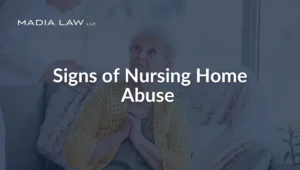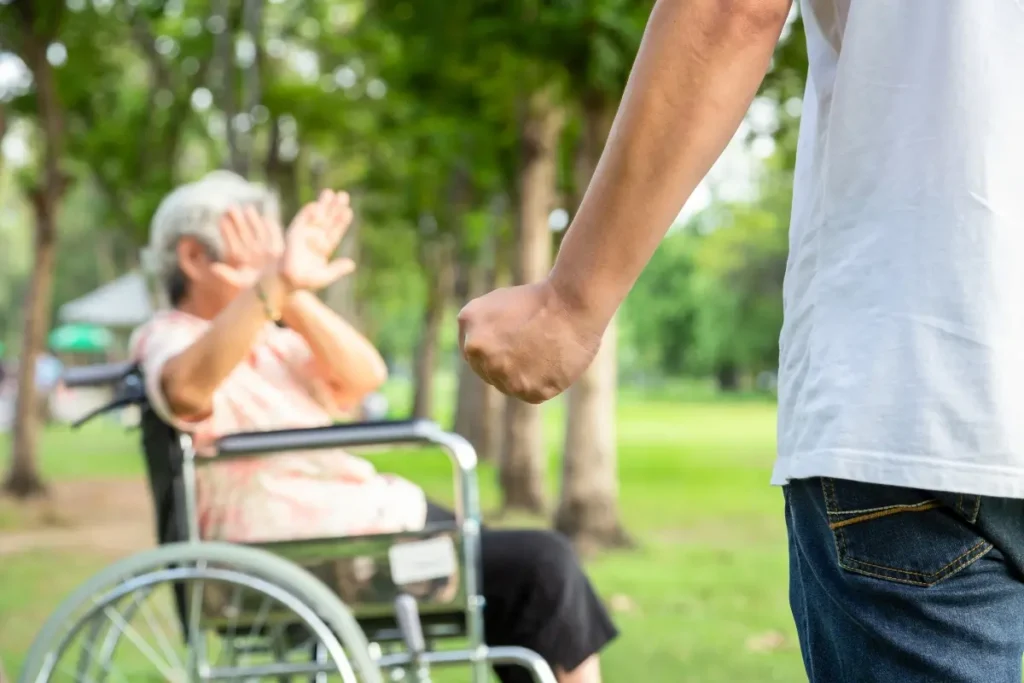
Families in Minnesota place immense trust in nursing homes to protect and care for their loved ones. When you notice subtle changes — such as unusual withdrawal, unexplained injuries, or visible signs of fear or discomfort — it may signal something far more serious than simple aging or illness. These red flags can point to nursing home abuse or neglect, which can take many forms: physical harm, emotional abuse, sexual misconduct, financial exploitation, or basic neglect of daily needs.
At Madia Law LLC, we have stood alongside countless families across Minnesota to expose abuse, hold negligent facilities accountable, and fight for justice. Our attorneys combine courtroom strength, meticulous case-building, and an unwavering commitment to results. If you suspect that a loved one is suffering in a care facility, we can help you understand your rights, protect your family member, and take decisive action.
How to Spot Early Signs of Nursing Home Abuse
Imagine a daughter watching her father tense up and flinch when staff members enter his room. When she questions it, a nurse casually says, “He’s just confused today.” While explanations like this may sound harmless, patterns of sudden fear, withdrawal, or unexplained physical changes should never be brushed aside.
Emotional and Psychological Abuse in Nursing Homes
Emotional abuse may not leave scars, but it deeply impacts mental health.
- Verbal threats or belittling can lead to anxiety or confusion.
- Intentional isolation or manipulation may erode a resident’s trust.
- Erratic behavior or withdrawal often signals prolonged emotional harm.
Legal cases rely on documentation, such as caregiver logs and witness statements. Abuse patterns over time support strong claims.
Physical Signs of Nursing Home Abuse
Certain physical injuries may indicate unsafe care.
- Unexplained bruising can suggest unauthorized restraint or rough handling.
- Friction burns or marks on wrists or ankles may indicate restraint use.
- Fractures or repeated falls without proper explanation raise concerns of neglect.
Delayed or vague responses from staff increase legal suspicion. These signs usually indicate violations of state and federal nursing home care laws.
Behavioral Clues Your Loved One May Be Hiding
Some residents cannot speak openly, especially if they have dementia.
- Sudden silence, fear of staff, or resistance to care may reveal distress.
- Loss of interest in activities once enjoyed is a key signal.
- Refusing to speak in front of staff could indicate fear.
Documenting these changes with times, dates, and witnesses supports early legal action.
Sudden Weight Loss in Elderly Nursing Home Residents
Unexpected weight loss usually indicates underlying neglect or malnutrition.
- Missed meals or restricted food access can cause malnutrition.
- Loss of appetite without a medical cause may reflect emotional abuse or retaliation.
- Clothing becoming noticeably loose can show long-term neglect.
Under Minnesota law, malnutrition and related weight loss can support civil claims for neglect.
Signs of Sexual Abuse in Elderly Residents
Sexual abuse signs frequently remain hidden because of resident shame or fear.
- Bruising in private areas or torn clothing should never be ignored.
- Sudden fear of bathing or avoidance of staff may indicate trauma.
- Diagnosed STIs in non-sexually active residents require investigation.
These signs must be reported immediately to Adult Protective Services. Legal action can begin once medical and testimonial evidence is secured.
Financial Exploitation of Nursing Home Residents
Unusual financial activity may indicate abuse.
- Coerced will changes or missing valuables raise red flags.
- Forged checks or unexplained withdrawals often point to fraud.
- Abuse of power of attorney is a common method of financial control.
Family members should monitor bank records and asset access. Civil claims for elder financial abuse can fall under Minnesota theft and fraud statutes.
For a legal consultation, call 612-349-2729
Why Early Recognition of Abuse Signs Saves Lives
Abuse in nursing homes rarely begins with obvious injuries. It often starts with subtle changes — like sudden withdrawal, unexplained bruises, or rapid weight loss — are often brushed off with excuses, but they may signal serious danger. When these red flags are ignored, abuse and neglect can escalate quickly, leading to long-term harm or even death.
By recognizing and acting on these signs early, families can:
- Protect health and safety: Prompt intervention can prevent minor issues from escalating into serious injuries or medical emergencies.
- Stop ongoing abuse: Confronting concerns early may uncover harmful patterns of mistreatment before they worsen.
- Preserve critical evidence: Documenting early warning signs helps build a stronger legal case, ensuring facilities are held accountable.
- Safeguard dignity and quality of life: Quick action helps restore trust, compassion, and respect to vulnerable residents.
In short, early recognition doesn’t just improve outcomes — it can literally save lives. Families who trust their instincts and take swift action give their loved ones the best chance at safety, justice, and proper care.
In one Minnesota case, a family who noticed sudden personality changes and visible marks on their loved one took immediate action. Their documentation led to an investigation that exposed widespread abuse, held the facility accountable, and stopped the mistreatment.
Every observation matters. Documenting early changes — no matter how small — is both a moral duty and a powerful legal safeguard. It protects your loved one’s dignity, preserves vital evidence, and can save lives.
What to Do If You Suspect Nursing Home Abuse
If you suspect abuse, act immediately. Document all visible injuries, note behavioral changes, and report concerns to senior staff in writing. Contact Adult Protective Services or the Minnesota Department of Health. Seek legal advice from a nursing home abuse attorney to protect your loved one and begin a formal claim.
How to Document Signs of Nursing Home Abuse
Documentation strengthens legal claims and prevents care facilities from denying harm. Collect timestamped photographs of visible injuries, note any unusual behavior, and keep written records of conversations with staff.
- Take clear, dated photos of injuries or unsafe conditions.
- Keep a journal of concerning behavior or staff responses.
- Request copies of incident reports or facility notes.
- Record names of involved staff or witnesses.
When to Report Concerns to Nursing Home Staff
Concerns should be reported promptly to management in writing. This creates a formal record and pressures the facility to respond.
- Notify the director of nursing, administrator, or care manager.
- Include details: dates, behavior changes, and injuries.
- Keep a copy of your written report.
- Track if and how the facility responds.
How to Contact Minnesota Adult Protective Services (APS)
APS investigates abuse reports involving vulnerable adults. You can report suspected abuse confidentially.
- Visit the Minnesota Adult Abuse Reporting Center at mn.gov/dhs.
- Call the 24/7 hotline: 844-880-1574.
- Be ready with the resident’s name, facility info, your concerns, and observed dates.
- Ask for confirmation your report was received.
When to Seek Emergency Medical Help
Call 911 or take the resident to a hospital for any sign of severe injury. Signs include unconsciousness, sudden health decline, or suspected assault. Emergency care from independent providers ensures safety and generates medical records crucial for legal claims.
How to File a Complaint with Minnesota Health Department
The Office of Health Facility Complaints (OHFC) handles licensing violations. File complaints through:
- Online: mn.gov/health.
- Email: health.fpc-web@state.mn.us
- Phone: 651-201-4200
- Include: resident’s name, facility address, incident details, and your contact information.
- Complaints can be anonymous.
Why You Should Contact a Nursing Home Abuse Attorney
An attorney protects your rights, manages communication with the facility, and builds a strong case using the collected evidence. Legal support ensures the facility is held accountable.
- Legal consultations clarify if you have a case.
- Attorneys review documents and medical records.
- Representation ensures deadlines and filing rules are followed.
- Madia Law LLC focuses on elder abuse litigation across Minnesota.
Click to contact our personal injury lawyers today
Legal Rights of Nursing Home Residents in Minnesota
A resident being yelled at by a staff member, yet staying silent out of fear of retaliation. Sadly, many residents feel powerless in these situations. But under Minnesota law and federal regulations, every nursing home resident is guaranteed the right to be treated with safety, dignity, respect, and freedom from abuse or neglect.
Minnesota’s Right to Be Free from Abuse or Neglect
Every nursing home resident in Minnesota has a legal right to live free from abuse and neglect. This includes protection from physical harm, emotional mistreatment, and medical negligence. These rights are upheld by both state and federal standards.
- Outlined in the Minnesota Nursing Home Resident Bill of Rights.
- Supported by the federal Nursing Home Reform Act.
- Violations can lead to lawsuits, fines, and license loss.
- Facilities must document and prevent any form of abuse.
Right to Privacy, Dignity, and Respect in Care Homes
Residents must be treated as individuals with full dignity and privacy. This means honoring their preferences and protecting their personal space during care.
Examples of dignity violations include:
- Being undressed or exposed in communal areas.
- Using mocking or demeaning language.
- Ignoring food or bathing preferences.
Legal Protections Against Retaliation for Complaints
Residents and families are protected when speaking up. Federal law prohibits nursing homes from punishing residents for filing complaints or reporting concerns. Retaliation, like isolation, verbal threats, or care changes, is illegal.
Facilities must:
- Allow written grievances without penalty.
- Maintain grievance logs and track follow-ups.
- Cooperate with ombudsman investigations.
Minnesota Vulnerable Adults Act: Key Protections
The Minnesota Vulnerable Adults Act (VAA) protects adults in licensed care from abuse, neglect, and exploitation. It applies to nursing homes, assisted living, and other care settings.
Key protections under the VAA:
- Mandated reporting of suspected abuse.
- Investigations by state agencies like APS or MDH.
- Civil and criminal penalties for confirmed violations.
- Legal standing to pursue claims for injured residents.
Madia Law LLC uses the VAA to hold nursing homes accountable in abuse litigation.
Complete a Case Evaluation form now
Emotional Toll of Elder Abuse on Victims and Families
Elder abuse inflicts deep emotional wounds that last long after the physical harm fades. Many residents experience depression, anxiety, or post-traumatic stress. Some stop speaking altogether, withdraw from others, or show sudden changes in personality. When trust in caregivers is broken, it can leave victims feeling isolated, powerless, and fearful of future interactions.
For families, the trauma is different but just as heavy. Guilt often surfaces — guilt for missing warning signs, or for placing a loved one in the facility at all. Anger and helplessness set in, particularly when abuse has been hidden, minimized, or dismissed by staff. These emotions can escalate into long-term stress and burnout, straining family relationships and leaving scars that are hard to heal.
The emotional toll of elder abuse reminds us that these cases aren’t just about legal rights — they’re about human dignity and the trust families place in care providers. Addressing abuse quickly not only protects physical safety, but also helps restore a measure of emotional stability and peace of mind for both victims and their loved ones.
Common Excuses Nursing Homes Use to Deflect Abuse Claims
Nursing homes often try to dismiss or reframe abuse complaints. Families may hear explanations that downplay signs or shift blame to the resident’s condition. These tactics delay accountability. Legal counsel helps cut through deflection and demand answers.
| Excuse | How Legal Help Responds |
|---|---|
| “That’s just dementia behavior.” | Attorneys investigate if behavioral changes stem from mistreatment, not disease progression. |
| “They bruise easily at their age.” | Medical experts examine whether injuries are consistent with accidental causes or abusive force. |
| “We have no record of that happening.” | Legal teams demand records and witness statements. Missing documentation can signal negligence. |
| “They never reported it to us.” | Victims often fear retaliation. The law protects their right to safety without needing prior complaint. |
Don’t accept vague answers, speak with Madia Law LLC to investigate the truth.
Why Families Across Minnesota Trust Madia Law LLC
Madia Law LLC has been protecting vulnerable seniors and winning justice in elder abuse litigation. We bring courtroom experience, personal commitment, and focused expertise to every case we take.
| Factor | What It Means |
|---|---|
| Trial Experience | We prepare every case for court, not just quick settlements. |
| Elder Abuse Focus | Our team concentrates on complex elder abuse litigation. |
| Client-Centered Support | We keep families informed and involved every step of the way. |
| Contingency-Based Fees | You don’t pay unless we win compensation for your family. |
How to Choose a Safe Nursing Home in Minnesota
Choosing a nursing home is a critical decision. Families must look beyond brochures and ask direct questions about safety, care quality, and resident treatment. Even trusted facilities should be evaluated with care.
Key things to check:
- State Inspection Reports – Look for recent violations or complaints.
- Staff-to-Resident Ratios – Higher ratios may mean slower care or neglect.
- Resident Interaction – Visit unannounced and observe how staff treat residents.
- Cleanliness & Safety – Check for odors, spills, or signs of disrepair.
- Resident Feedback – Talk to current residents or their families if possible.
- Staff Turnover – High turnover can signal deeper management issues.
If you are unsure, consult with an elder law attorney to help assess safety and legal risk before placement.
FAQs About Signs of Nursing Home Abuse and Neglect
What’s the Difference Between Nursing Home Neglect and Abuse?
The difference between nursing home neglect and abuse lies in intent. Abuse is intentional harm, like hitting or threatening. Neglect is failure to provide care, such as missed medications or ignoring hygiene needs. Both violate resident safety laws.
Can You Sue a Minnesota Nursing Home for Elder Abuse?
Yes, you can sue a Minnesota nursing home for elder abuse if the facility or staff caused physical, emotional, or financial harm. Lawsuits can recover compensation and hold the nursing home legally accountable under state and federal elder protection laws.
Who Do You Report Nursing Home Abuse to in Minnesota?
To report nursing home abuse in Minnesota, contact Adult Protective Services, the Minnesota Department of Health, or a local ombudsman. Reports should include resident details, observed abuse signs, staff involved, and relevant dates or incidents to prompt state investigation.
How Long Do You Have to Sue for Nursing Home Abuse?
In Minnesota, you have four years to sue for nursing home abuse. This statute of limitations begins from the date the abuse was discovered or reasonably should have been discovered. Filing after the deadline usually results in dismissal of the case.
Speak With a Nursing Home Abuse Lawyer in Minneapolis Today
If your loved one shows signs of abuse in a nursing home, immediate get in touch with Minneapolis Nursing Home Abuse Lawyer to prevent further harm and protect their rights. Delays can allow mistreatment to continue unchecked; timely help safeguards both their dignity and safety.
Madia Law LLC pursues elder abuse cases with focus, strategy, and experience. Our team evaluates every case thoroughly, with no upfront cost and no fees unless we recover compensation. Contact us today to discuss your concerns and explore your legal options.
Call 612-349-2729 or complete a Case Evaluation form




